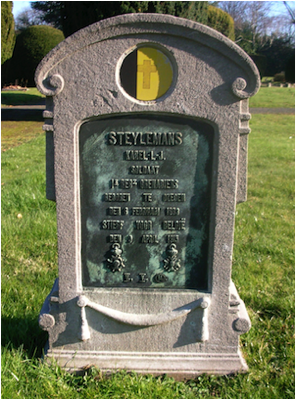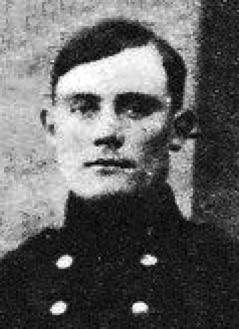Karel Louis Joseph Steylemans was a Belgian soldier who was wounded in his homeland and evacuated to the Hylands Auxiliary Military Hospital as a result in November 1914. After eight weeks he was transferred to another hospital at Pleshey where he bit the end of a thermometer and swallowed parts of it. He returned to Hylands in February 1915 and two months later he died there from blood poisoning. An inquest concluded that the blood poisoning was caused by an abscess in his trachea, which had in turn been caused by ‘some foreign body’ most probably parts of the thermometer. He was later buried at the Chelmsford Borough Cemetery in Writtle Road.
STEYLEMANS, KAREL LOUIS JOSEPH*,
1st Regiment, Grenadiers, Belgian Army
He would give no reason for this, and would say he was all right. He would cough and gasp, but not, much notice was taken of this after a time, as he was very full jokes and pranks
The morning before left he was very flushed, and the witness kept him in bed and called the doctor's attention to him. Those symptoms were noticeable a month before the thermometer incident. There was no expectoration from the cough—it was quite a dry husk.
Dr. W. D. Gimson, one the honorary medical staff at the Hylands Hospital. said he had Karel under his charge inNovember Karel was there eight weeks. time has removal to his condition was normal. At the time of his removal to Pleshey his condition was normal.
He was sent there with bad finger to see it would improve before amputation. Upon his return from Pleshey on 10th February the witness was going amputate the finger, as it was useless. Karel's temperature was 101.5. It gradually went up from that time until it reached 104.8. He had husky cough, and afterwards developed expectoration, which latterly became blood-stained, as if there was some irritant in the lung. They could find no signs anything wrong, although various tests were made. Ten different medical men examined him at various times, but could find no physical signs account for his temperature. He continued in this condition until he died. The only real thing he complained of was pain deeply seated under the breast bone. He was very neurotic, and minutes after some pain would laughing and would forget all about it.
At a post-mortem examination the witness failed find anything wrong with the lungs, but behind discovered the trachea a small abscess, about a size of a walnut, and a mass of enlarged and inflamed glands around it. He found no trace of glass or any foreign body which could produced the abscess, and could find no other cause for the abscess.
The Coroner (Mr. C. E. Lewis) asked: "You think the abscess must have been produced the introduction some foreign body?"
"Yes, I do. I do not see what else could have produced it. I attribute death to blood poisoning from the abscess, which was in such a position that no operation could have been performed. It was not tubercular. It was impossible to diagnose it. Absolutely impossible. It is one of the very few places you could not unless it developed outwardly. The expectoration was such as you get from constant irritation. I examined most carefully, but could not find any glass —you would be lucky to find a splinter. My theory is that he crunched the glass the between his teeth, and plenty of sharp fragments might get through and cause this, He thought the thermometer incident an excellent joke when did it."
The Lady Superior said: "Yes; he was only boy."
Dr. Gimson said: "But you don't eat thermometers for fun," which led to laughter in the court.
The jury found that death was due to blood poisoning, set up an abscess, the result of some foreign body.
The funeral took place on the morning of 13th April 1915 with full military honours. The coffin, covered with the Belgian flag, had rested in the Roman Catholic Church in Chelmsford overnight, and the Rev. Watson celebrated Requiem Mass there. There was a numerous congregation, including several convalescent Belgian soldiers, who afterwards followed to Chelmsford Borough Cemetery, where the interment took place in grave 181. The R.F.A. Band played the funeral music; buglers from that unit sounded the Last Post, and the Warwickshire Royal Artillery provided the firing party and escort. Among the .wreaths were one from Sir Daniel and Lady Gooch, owners of Hylands, and one the and nurses at Hyiands.
The auxiliary military hospital at Hylands House had established in the first few weeks of the war in August 1914 when the owner of the Hylands Estate, Sir Daniel Gooch, Bart., offered the building to the Red Cross. Initially it was used for soldiers of the South Midland Division which was billeted in the Chelmsford area in the early months of the war. Hylands became the headquarters of the 2nd and 3rd South Midland Field Ambulance.
Over 500 patients had been through the wards by October 1914 when the military transferred from Hylands to a hospital established at Oaklands Park, Chelmsford, making way for Belgian wounded. Later that month the hospital received its first British Expeditionary Force eases who had arrived in Harwich. The hospital continued to take ail the heaviest oases from the Middlesex War Hospital, Clacton-on-Sea, and the General Military Hospital, Colchester. The hospital was closed in April 1919.
150916

Karel was born in Okegem, Oost-Vlaanderen in Belgium on 3rd February 1893.
During the First World War he served as a Private in then 1st Regiment Grenadiers. He
died on 9th April 1915 at the Hylands Auxiliary Military Hospital at Widford near Chelmsford in bizarre circumstances.
An inquest into his death was held there on 12th April 1915. 21 year-old Karel, who had been patient at hospital at Hylands suffering from shrapnel wounds in the hand. Death occurred on the previous Friday night. Evidence was heard from a number of witnesses.
Mary Winifred Posting, sister-in-charge at Hylands Hospital, said Karel was admitted on 14th November 1914, and remained there for eight weeks. He was then transferred the House of Prayer, Pleshey, previous to the proposed amputation of a finger. He returned on 16th February 1915. She stated Karel never mentioned any difficulty swallowing or of having swallowed part a thermometer.
Elizabeth Slater, Mother Superior the House Prayer, said the deceased was at that institution from 29th December 1914 until 19th February 1915. In the middle of January he had influenza very slightly, and he had various lapses until he left. About the January or the beginning of February he was tested by thermometer and during the absence of the nurse bit the end off, and said he had swallowed it. The nurse reported it to the witness, and said she could find no trace of the bulb part. Karel laughed at the occurrence. The nurse gave him a slight scolding and washed out his mouth, and further action was taken.
Karel never complained about any result from it. Before this occurrence there was certain amount of symptom, his temperature rising to 101, and would place coId bandages on his forehead when he went to bed.
